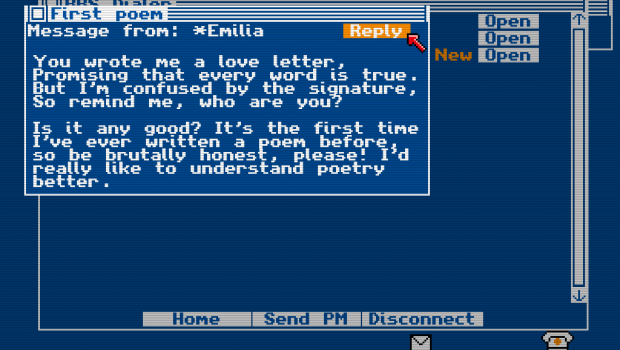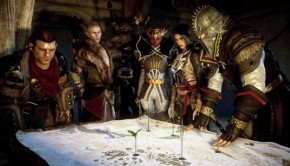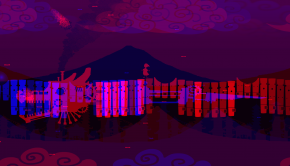Love Week: Digital
When you reach a failure state in a lot of games-whether that’s a lost life, a trip back to the last checkpoint, or a total Game Over-there’s a tension between the player’s ability and the game state. Was your play subpar? Did you not have the tools to win? Or did you just get an unlucky roll of the dice? The last possibility can fool many into thinking that they need to improve their play, when just giving it another try would be likely to result in the success they need.
Visual novels generally don’t have failure states, and Digital: A Love Story is no exception. But it does have the threat of a failure state, and the interplay between the player’s awareness of the visual novel form and the “ticking clock” of a particular in-game mechanism provides a tension unique within the genre.
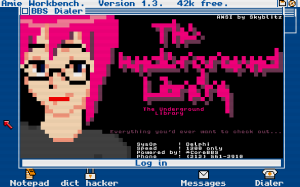 Digital’s unique hook is that the story is told through a simulacrum of BBS software, which older readers will remember as a proto-Internet before the advent of consumer services like Prodigy, AOL, and CompuServe, which were themselves precursors to the World Wide Web. Using a BBS meant directly dialing into another system using your modem, at which point you could check messages or play rudimentary social games. (I distinctly recall having quite a few friends in Legend of the Red Dragon on my local BBS whom I never met in person.)
Digital’s unique hook is that the story is told through a simulacrum of BBS software, which older readers will remember as a proto-Internet before the advent of consumer services like Prodigy, AOL, and CompuServe, which were themselves precursors to the World Wide Web. Using a BBS meant directly dialing into another system using your modem, at which point you could check messages or play rudimentary social games. (I distinctly recall having quite a few friends in Legend of the Red Dragon on my local BBS whom I never met in person.)
The player is cast as someone new to the world of BBSes; just as with the real thing, you must manually dial each board number and enter your password every time you access one. It’s not long before you leave the family-friendly Lake City Local BBS and venture onto the slightly dubious but still locally-accessible Matrix board. There, you hear about a wider world of digital systems just begging to be accessed. But these new BBSes require long distance phone access, which cost dearly in those days. To avoid paying the per-minute charges, you learn of a way to exploit prepaid codes, valid lists of which are circulated among the script kiddies at the Matrix. Of course, the phone company always has an eye out for people taking advantage of the system, and is quick to shut down codes which show signs of widespread use.
Naturally, the way that Digital is structured requires you to constantly log on and off of various BBS systems, checking in with the habitués of each, until that first blood-freezing moment when the code you’ve been using is no longer valid. You cross it off the list and move on to the next one, but the message is clear: you don’t have forever to do this. At some point you’re going to run out of codes (sorry, c0dez), and you start to wonder with every disconnection from a long-distance BBS: how badly can I screw this up? Can I fail? Have I already failed? As the codez tick away, crossed off one by one, there comes a crushing point when the last code on the list is no longer valid, and it feels like a Game Over.
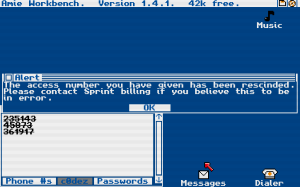 It’s not actually the end, mind you. As I mentioned, Digital doesn’t have a true failure state, and with a bit of digging, the story moves on. (A little later, there’s even what might be construed as the author giving a little tweak to those who were worried the c0dez might have dried up.) But this moment doesn’t come until the stakes for you and your online friends have been well and truly raised, so even the appearance that you’ve failed clearly indicates to the player how thoroughly they’ve become invested in the story. How real your concern for these people has become, whether or not you’ve met them in the flesh-or ever will. The mere specter of failure gives the story a certain weight that not many visual novels otherwise achieve.
It’s not actually the end, mind you. As I mentioned, Digital doesn’t have a true failure state, and with a bit of digging, the story moves on. (A little later, there’s even what might be construed as the author giving a little tweak to those who were worried the c0dez might have dried up.) But this moment doesn’t come until the stakes for you and your online friends have been well and truly raised, so even the appearance that you’ve failed clearly indicates to the player how thoroughly they’ve become invested in the story. How real your concern for these people has become, whether or not you’ve met them in the flesh-or ever will. The mere specter of failure gives the story a certain weight that not many visual novels otherwise achieve.
There’s a lot in Digital: A Love Story that presages themes and motifs Love would revisit later to better effect; while the actual plotting of Digital is on the thin and predictable side, it at least briefly raises the issues of privacy in a digital world, the nature of interpersonal relationships with artificial intelligences, and the difficulty of weaving disparate records into a historical narrative. But the tactile, engaging feel of the interface and looming threat of failure—to say nothing of the quality of the prose, evident even in Love’s first game—make it worth your while to play for yourself.

